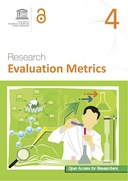Explore

Open Access for Researchers 4: Research Evaluation Metrics
8 Ungluers have
Faved this Work
Login to Fave
At present, research is going on all over the world practically in all subjects and generating millions of research articles and other documents. In some cases, the research works are generating very good results, in most cases mediocre, and in some cases negative results. Basing research results, awards, fellowships, promotion, selection for a job, etc are decided. For all these, evaluation of research output becomes sine qua non.
This module dwells on a number of methods (including old and new) available for research evaluation. The module comprises the following four units:
The curricula for researchers entitled “Open Access for Researchers” addresses OA issues within the community of research scholars. The modules cover the subject areas of Scholarly Communications, Concepts of Openness and Open Access, Intellectual Property Rights and Research Evaluation Metrics. The first four modules have been developed to nurture researchers with an elaborate understanding of the genesis, objectives, processes, types and existing limitations of OA scholarly communication, which include insights into the issues related to IPR, the methods and limitations of the process of peer reviewing and the concepts and roles of E-journals, databases, ICTs, OSS and other OERs. The final and fifth Module entitled “Sharing your Work in Open Access” provides a step-wise guideline for researchers about the process and options available for publishing their research work.
These curricula were developed after undertaking two detailed capacity building need assessment studies of librarians and researchers on Open Access. A multi-stakeholder expert meeting was organized in New Delhi, where 23 experts participated to finalize the curriculum. Two online consultations were also held to substantiate the expert meeting, which helped UNESCO to outline the content for each of the curriculum and provided a framework to develop modules.
The curricula were developed with the help of Commonwealth Educational Media Centre for Asia (CEMCA), New Delhi of the Commonwealth of Learning (COL).
This module dwells on a number of methods (including old and new) available for research evaluation. The module comprises the following four units:
- Unit 1. Introduction to Research Evaluation Metrics and Related
- Indicators.
- Unit 2. Innovations in Measuring Science and Scholarship: Analytical
- Tools and Indicators in Evaluation Scholarship Communications.
- Unit 3. Article and Author Level Measurements, and
- Unit 4. Online Citation and Reference Management Tools.
- Open Access for Researchers 1: Scholarly Communications
- Open Access for Researchers 2: Concepts of Openness and Open Access
- Open Access for Researchers 3: Intellectual Property Rights
- Open Access for Researchers 5: Sharing your Work in Open Access
The curricula for researchers entitled “Open Access for Researchers” addresses OA issues within the community of research scholars. The modules cover the subject areas of Scholarly Communications, Concepts of Openness and Open Access, Intellectual Property Rights and Research Evaluation Metrics. The first four modules have been developed to nurture researchers with an elaborate understanding of the genesis, objectives, processes, types and existing limitations of OA scholarly communication, which include insights into the issues related to IPR, the methods and limitations of the process of peer reviewing and the concepts and roles of E-journals, databases, ICTs, OSS and other OERs. The final and fifth Module entitled “Sharing your Work in Open Access” provides a step-wise guideline for researchers about the process and options available for publishing their research work.
These curricula were developed after undertaking two detailed capacity building need assessment studies of librarians and researchers on Open Access. A multi-stakeholder expert meeting was organized in New Delhi, where 23 experts participated to finalize the curriculum. Two online consultations were also held to substantiate the expert meeting, which helped UNESCO to outline the content for each of the curriculum and provided a framework to develop modules.
The curricula were developed with the help of Commonwealth Educational Media Centre for Asia (CEMCA), New Delhi of the Commonwealth of Learning (COL).
Why read this book? Have your say.
You must be logged in to comment.
Rights Information
Are you the author or publisher of this work? If so, you can claim it as yours by registering as an Unglue.it rights holder.Downloads
This work has been downloaded 771 times via unglue.it ebook links.
- 771 - pdf (CC BY-SA) at Internet Archive.
Keywords
- Nonfiction
- Open access publishing
- Scholarly Communication
- Textbooks
Editions

